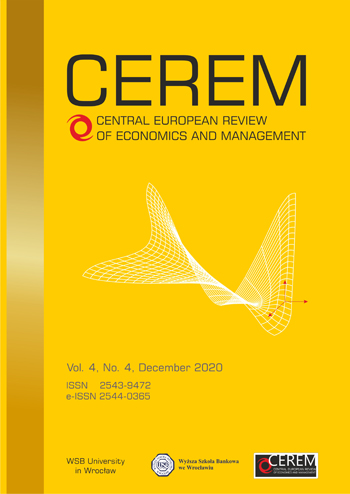Optimism in a time of uncertainty. Spinoza, Kant and the eternal peace
DOI:
https://doi.org/10.29015/cerem.892Keywords:
Philosophy; political sociology; democracyAbstract
Aim: This article describes ideas of Enlightenment thinkers about the building of a democratic state with responsible and rationally thinking citizens. The article starts with the ideas of Spinoza, formulated in the seventeenth century, and will end in our time, where democracy is under threat.
Design/Research method: The article relies on professional publications, both within the fields of philosophy and political sociology.
Conclusions/findings: The study concludes that the optimistic expectations about the increase of democracy and the stability of democratic institutions in the world are no longer valid.
Originality/Value of the article: Recent developments in the political field in the western world make this optimism questionable
References
Castells M. (2000), The information age. Economy, society and culture, vol. III: End of millennium, 2nd ed., Blackwell Publishers, Oxford 2000.
Coser L.A. (1971), Masters of sociological thought. Ideas in historical and social context, Harcourt Brace Jovanovich, Inc., New York, Chicago, San Francisco, Atlanta.
Elias N. (1982), Het Civilisatieproces, sociogenetische en psychogenetische onderzoekingen, deel 1 en 2 Aula, Uitgeverij Het Spectrum, Utrecht, Antwerpen.
European Parliament (2020), 2019 European election results, https://www.europarl.europa.eu/election-results-2019/en/turnout/ [17.12.2020].
Fukuyama F. (2012), The end of history and the last man, Penguin Books, London.
Fukuyama F. (2014), Political order and political decay, Profile Books LTD, London.
Gullan-Whur M. (2000), Within reason. A life of Spinoza, Pimlico, Random House, London.
Habermas J. (1962), Strukturwandel der Offentlichkeit, Hermann Luchterhand Verlag GmbH, Neuwied, Berlin.
Heller A. (1990), A philosophy of morals, Basil Blackwell, Cambridge, MA.
Edwards-Levy A. (2020), The GOP is very much Trump’sParty, Poll shows, Huffington Post, https://www.huffpost.com/entry/poll-republican-party-trump_n_5f4bfb18c5b697186e37936a, [10.09.2020].
Inglehart R. (2016), The danger of deconsolidation. How much should we worry?, “Journal of Democracy”, vol. 27 no. 3, pp. 18-23.
Israel J.I. (2001), Radical Enlightenment. Philosophy and the making of modernity 1650-1750, Oxford University Press, Oxford.
Israel J.I. (2019), The Enlightenment that failed. Ideas, revolution, and democratic defeat, 1748-1830, Oxford University Press, Oxford.
Kant I. (1784a), An answer to the question: What is Enlightenment?, Immanuel Kant: Ethics Reference Archive, https://www.marxists.org/reference/subject/ethics/kant/index.htm [01.12.2020].
Kant I. (1784b), Idea for a universal history from a cosmopolitan point of view, Immanuel Kant: Ethics Reference Archive, https://www.marxists.org/reference/subject/ethics/kant/universal-history.htm [01.12.2020].
Kant I. (1984), Zum ewigen Frieden, Philipp Reclam Verlag, Stuttgart.
Pinker S. (2018), Enlightenment now, Penguin Books, Random House, London.
Popper K.R. (1977), The open society and its enemies, vol. 2: Hegel & Marx, Routledge & Kegan Paul, London, Henley.
Putnam R.D. (2000), Bowling alone. The collapse and revival of American community, Simon & Schuster, New York.
de Regt A. (1984), Arbeidersgezinnen en beschavingsarbeid. Ontwikkelingen in Nederland 1870-1940, Boom Meppel, Amsterdam.
De Regt A. (2015), Beschavingsoffensief (civilising offensive): from sociological concept to moral appeal, “Human Figurations”, vol. 4 no. 1, http://hdl.handle.net/2027/spo.11217607.0004.103 [17.12.2020].
Spengler O. (2017), Der Untergang des Abendlandes – Umrisse einer Morphologie der Weltgeschichte, Anaconda Verlag, Köln.
Spinoza de B. (1979), Ethica. Wereldbibliotheek, Amsterdam.
Spinoza de B. (2001), The Ethics (Ethica Ordine Geometrico Demonstrata), transl. from the Latin by R.H.M.Elwes, www.gutenberg.org/files/3800/3800-h/3800-h.htm [01.12.2020].
Spinoza de B. (2004), A theologico-political treatise and a political treatise, Dover Philosophical Classics, Dover Publications, Inc., Mineola, New York.
van der Woud A. (2015), De Nieuwe Mens, de culturele revolutie in Nederland rond 1900, Prometheus, Bert Bakker, Amsterdam.
van Zanden J.L., Prak M. (2006), Towards an economic interpretation of citizenship. The Dutch Republic between medieval communes and modern nation-states, “European Review of Economic History”, vol. 10 no. 02, pp. 111-145.
Downloads
Published
Issue
Section
License
The aim of CEREM is to make scientific work available in accordance with the principle of open access. The rules mentioned below are important, as they enable CEREM and its publisher, the WSB Merito University in Wroclaw, to distribute the scientific work to a wide public while complying with specific legal requirements, at the same time protecting the rights of the authors.
The author transfers to the WSB Merito University in Wroclaw, free of charge and without territorial limitations, with all proprietary copyrights to the said piece of work in the understanding of the act of 4th February 1994 on copyrights and derivative rights (Journal of Laws of 1994, no. 24, item 83, as amended) on an exclusivity basis, i.e. the rights to:
1. Make the piece of work in question available via the Digital Library established by the WSB Merito University in Wroclaw.
2. Produce, record and reproduce in multiple copies the piece of work using any techniques whatsoever, including printing, reprography, magnetic recording and digital processing, and particularly its reproduction by recording on CDs and similar data carriers,
3. Use fragments of the piece of work for promotional purposes in publications, promotional materials, the Internet and Intranet type networks managed by the WSB Merito University in Wroclaw.
4. Store the piece of work into computer databases managed by the WSB Merito University in Wroclaw.
5. Copy and reproduce the piece of work using photo-mechanic technologies other than those commonly known at the time of the signature hereof (photocopies, Xerox copies etc.),
6. Process the piece of work, transferring it into an electronic form, and distribute it on the Internet without limitations.


